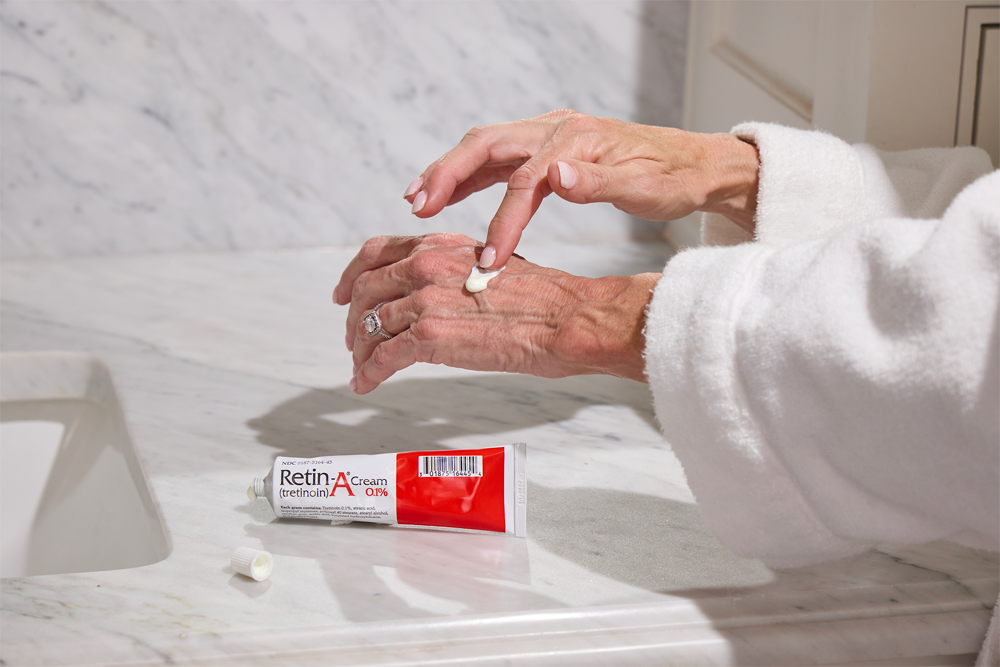When winter hits, your skin gets defensive. Cold winds, harsh indoor heating, and low humidity work together to strip your skin barrier, leaving you vulnerable to flare-ups, irritation, and deeper dehydration. For many, winter becomes the season of cracked hands, itchy legs, inflamed cheeks, and stubborn rashes. The question is: can over-the-counter (OTC) skincare really handle this onslaught, or is it time to consider a prescription solution?
Winter Skincare Prescription Medications vs. OTC: What Works Best?
Reviewed by Adam Gardner, Licensed Pharmacist & COO of TelyRx

Table of Contents
what winter really does to your skin
Winter weather causes clinically significant changes in skin function, hydration, and inflammation. Some reasons include:
- Humidity drops sharply in winter months, especially in colder climates. When the air holds less moisture, your skin loses hydration faster through a process known as transepidermal water loss (TEWL). This means your skin literally dries out from the inside out, even if you’re moisturizing regularly.
- Cold air and wind strip away your skin’s natural lipids, which normally act like a sealant to keep moisture in and irritants out. At the same time, indoor heating systems blast dry air, accelerating the cycle. This leads to microcracks in your skin barrier, increasing the risk of redness, stinging, and environmental sensitivity.
- Sebum production naturally decreases in colder temperatures. This drop in oil makes skin more vulnerable to inflammatory reactions, especially in those with pre-existing conditions. For people with eczema, psoriasis, or rosacea, even minor barrier disruption can lead to major symptom flares.
- Circulation slows down in cold weather, which can reduce the delivery of oxygen and nutrients to skin cells. This not only impairs skin healing but also contributes to a dull, uneven tone that amplifies signs of fatigue and aging.
- Aging concerns intensify. Without adequate hydration, the skin loses plumpness, making fine lines, texture, and flaking more visible, even in people who typically don’t notice them during other seasons.
Some studies show that transepidermal water loss increases by up to 25% in winter months, particularly in areas like the cheeks, hands, and lips.
In short: winter isn’t just uncomfortable – it rewires how your skin functions. For those with sensitive skin, chronic skin conditions, or aging concerns, this shift requires more than just a thicker moisturizer. It demands a targeted, condition-specific skincare strategy, and in many cases, prescription support.
common skin conditions heightened in the winter

Let’s break down the most common skin issues that flare in cold months and compare OTC options with prescription skincare.
Anti-Aging (Winter Accelerates Aging Signs)
- OTC Treatments: Retinol, peptides, and hyaluronic acid serums. These offer steady improvements, though slower and less potent than prescription options.
- Prescription: Tretinoin (Retin-A). A gold-standard retinoid, tretinoin is up to 20 times more potent than OTC retinol.
- Why Rx Wins: It stimulates collagen, speeds cell turnover, and reduces winter dullness more effectively. Visible results can occur in as little as 6 weeks compared to the average of 6 months with OTC.
Eczema & Dermatitis
- OTC Treatments: Hydrocortisone 1%, ceramide-based moisturizers like CeraVe, or Eucerin.
- Prescription: Creams like Triamcinolone, Desonide, and Halobetasol.
- Why Rx Wins: Desonide is particularly useful because it’s a low-potency prescription steroid that’s safe for sensitive areas like the face or groin, where OTC options may fall short.
Itchy Skin (Winter Itch)
- OTC Treatments: Calamine lotion, oatmeal baths, and thick moisturizers.
- Prescription: Desonide for sensitive areas and topical/oral antihistamines.
- Why Rx Wins: Treats the root cause of inflammation and not just the itching sensation.
Psoriasis
- OTC Treatments: Salicylic acid shampoos and coal tar products.
- Prescription: Creams like Clobetasol and Halobetasol.
- Why Rx Wins: The National Psoriasis Foundation notes that most people experience plaque improvement within 4 weeks with proper prescription use.
Rosacea
- OTC Treatments: Niacinamide serums and other redness-reducing moisturizers.
- Prescription: Medications like Metronidazole or Ivermectin for mites.
- Why Rx Wins: It actually addresses the underlying causes of rosacea, not just cosmetic redness. A study found topical metronidazole gel reduced rosacea flare-ups by over 65% within 9 weeks.
Extremely Dry or Cracked Skin
- OTC Treatments: Shea butter, ceramide creams, and petrolatum-based ointments.
- Prescription: Urea cream (10–40%) and prescription barrier-repair medications.
- Why Rx Wins: Urea cream softens thickened skin and draws moisture deep into the dermis. Searches for “urea cream prescription” spike 200% each winter according to Google Trends.
winter skincare tips that actually work
Regardless of whether you use OTC or prescription treatments, certain skincare habits can dramatically improve results during the harsh winter months. Winter skincare isn’t just about what you apply—it’s also about when, how, and why you use it.
- Apply moisturizer within 2 minutes after showering – This is the “moisture window.” When skin is still slightly damp, applying cream or ointment helps trap hydration deep within the epidermis. Waiting even 5–10 minutes can greatly reduce absorption.
- Use ointments over lotions – Ointments, like petroleum jelly or prescription emollients, create a stronger barrier. This not only locks in moisture but shields against windburn, indoor heating, and other winter stressors. Lotions contain more water and evaporate quickly, offering less long-term protection.
- Switch to fragrance-free cleansers – Fragrances and sulfates in body washes and face cleansers can damage the skin barrier, especially in cold weather when skin is already compromised. Look for gentle, pH-balanced, non-foaming formulas instead.
- Use a humidifier at home – Indoor heating systems dry out the air, which pulls moisture from your skin. Placing a humidifier in your bedroom or workspace helps maintain a healthy humidity level (ideally around 40–50%), preventing dryness and itchiness.
- Avoid long, hot showers – Hot water strips away natural oils. While it may feel soothing, it leaves your skin vulnerable to cracking, flaking, and inflammation. Limit showers to 5–10 minutes and use lukewarm water instead.
- Layer skincare strategically – Apply hydrating serums (like hyaluronic acid) first, followed by barrier-repair creams, and top with an ointment or oil if needed. This layering approach mimics the skin’s natural lipid structure and enhances moisture retention.
- Wear gloves and protective clothing – Hands are especially prone to dryness and eczema in winter. Wearing gloves outside and cotton gloves overnight with a healing hand cream can prevent painful cracks and improve healing.
- Don’t skip sunscreen – UV rays are still present in winter, especially when reflecting off snow. Daily sunscreen use protects against photoaging and reduces flare-ups in conditions like rosacea and melasma.
- Address problems early – If you notice signs of eczema, itching, or cracked skin starting, address them immediately. Waiting too long can lead to infection or worsening symptoms. OTC creams can help mild symptoms, but prescription treatments often work faster and more effectively.
healthy skin all winter long

So, does winter make skin worse? The answer is a resounding yes, but it doesn’t have to stay that way. If you’re dealing with eczema, psoriasis, rosacea, or simply can’t shake dry, itchy skin, prescription skincare could be your best defense.
Getting prescription creams for dry skin or eczema treatment delivered to your door is convenient and affordable through TelyRx—no appointment or video call required.
Don’t wait for your skin to become cracked and sore. Treat it with the care it deserves this winter.
Triamcinolone
Triamcinolone is a topical steroid used to alleviate itching or inflammation associated with a variety of skin conditions such as atopic dermatitis (eczema), psoriasis, seborrheic dermatitis, and contact dermatitis.
Desonide
Desonide cream is a low-potency topical corticosteroid used to treat a variety of skin conditions, including eczema, dermatitis, allergies, and rash.
Tretinoin
Tretinoin is used for the treatment of improving fine lines and dark spots when used in addition to a daily skin care routine and protection from sun exposure.
Halobetasol
Halobetasol is a high-potency corticosteroid used to treat inflammatory skin conditions such as psoriasis and eczema.
Clobetasol
Clobetasol cream is a topical prescription corticosteroid indicated for the treatment of plaque-type psoriasis, moderate to severe scalp psoriasis, and steroid-responsive skin conditions.
Metronidazole
Metronidazole topical cream and gel is used for the treatment of inflammatory lesions and redness of rosacea.
Ivermectin Cream
Ivermectin 1% cream (Soolantra) is a topical prescription indicated for the treatment of inflammatory lesions of rosacea.
Urea Cream
Urea cream is a topical moisturizer used to treat dry, rough, and scaly skin conditions such as eczema, psoriasis, and keratosis.
Disclaimer
This blog post is for informational purposes only and does not constitute medical advice, diagnosis, or treatment. The content provided here is not a substitute for professional medical advice, consultation, or care from a qualified healthcare provider. Always seek the guidance of your physician or another licensed health professional with any questions you may have regarding a medical condition or treatment. Do not disregard or delay seeking professional medical advice based on information read on this site. Learn more about our editorial standards here.

